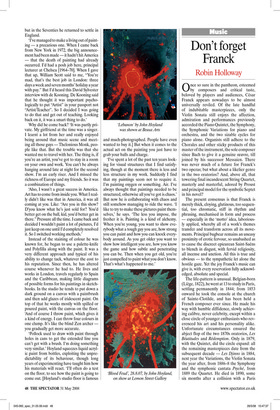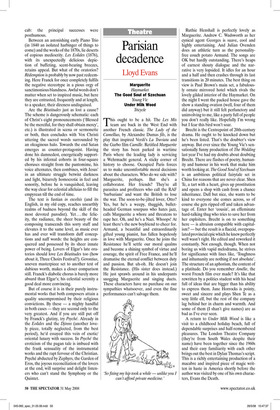Don’t forget Franck
Robin Holloway
Once so sure in the pantheon, esteemed by composers and critical taste, beloved by players and audiences, César Franck appears nowadays to be almost universally reviled. Of the late handful of indubitable masterpieces, only the Violin Sonata still enjoys the affection, admiration and performances previously accorded the Piano Quintet, the Symphony, the Symphonic Variations for piano and orchestra, and the two sizable cycles for piano alone. Organists still adhere to the Chorales and other sticky products of this master of the instrument, the sole composer since Bach to give it a genuine œuvre, till joined by his successor Messaien. There was never much of a future for Franck’s two operas; but what about a likelier genre in the two oratorios? And, above all, that towering final incandescent String Quartet, masterly and masterful, adored by Proust and principal model for the symbolic Septet in his novel?
The present consensus is that Franck is merely thick, cloying, glutinous, too sequential, too chromatic, stiff in rhythm and phrasing, mechanised in form and process — especially in the ‘motto’ idea, laboriously applied, whereby all of a work’s themes transfer and transform across all its movements. Principal bugbear remains an uneasy proximity of erotic fervour, so unabashed as to cause the discreet epicurean Saint-Satins to blench in disgust, with fervid religiosity, all incense and unction. All this is true and obvious — to the sympathetic let alone the hostile gaze. Yet the joy Franck’s music can give is, with every reservation fully acknowledged, absolute and special.
The life-pattern is unusual. Belgian-born (Liège, 1822), he went at 13 to study in Paris, settling permanently in 1844; from 1853 onward he took the console at the church of Sainte-Clotilde, and has been held a French composer ever since. He made his way with humble diffidence, slowly achieving calibre, never celebrity, except within a close circle of younger enthusiasts who reverenced his art and his personality alike. Unfortunate circumstances ensured the abject flop of the two 1870s oratorios, Les Béatitudes and Rédemption. Only in 1879, with the Quintet, did the circle expand: all the remaining masterpieces date from the subsequent decade — Les Djinns in 1884, next year the Variations, the Violin Sonata the year after, from 1886–8 the Symphony and the symphonic cantata Psyché, from 1889 the Quartet. He died in 1890, some six months after a collision with a Paris cab: the principal successes were posthumous.
Between an astonishing early Piano Trio (in 1840 an isolated harbinger of things to come) and the works of the 1870s, lie deserts of copious mediocrity. Les Eolides (1876), with its unexpectedly delicious depiction of buffeting, scent-bearing breezes, retains appeal. But what of the oratorios? Rédemption is probably by now past redeeming. Here Franck for once completely fulfils the negative stereotype in a pious orgy of sanctimonious blandness. Awful words don’t matter when set to inspired music, but here they are entrusted, frequently and at length, to a speaker, their direness undisguised.
Are the Béatitudes just as lost a cause? The scheme is dangerously schematic: each of Christ’s eight pronouncements (‘Blessed be the merciful, for they shall obtain mercy’, etc.) is illustrated in scena or sermonette or both, then concludes with Vox Christi uttering the sacred words surrounded by an oleaginous halo. Towards the end Satan emerges as counter-protagonist. Having done his damnedest, energetically supported by his infernal cohorts in four-square choruses straight from the pantomime, his voice alternates, then combines, with Jesus’ in an ultimate struggle betwixt darkness and light, bizarrely homoerotic in feel and sonority, before he is vanquished, leaving the way clear for celestial alleluias to fill the empyrean till the end of time.
The text is fustian in excelsis (and its English, in my old copy, reaches unearthly realms of badness beyond the skill of the most devoted parodist). Yet ... the felicity, the radiance, the sheer beauty of the composing transcends this sorry stuff and elevates it to the same level, as music ever has and ever will transform duff conceptions and naff words: the heights are conquered and possessed by its sheer innate power of being. Lovers of Elgar’s late oratorios should love Les Béatitudes too (how about it, Three Choirs Festival?). Gerontius, uneven masterpiece set to another text of dubious worth, makes a closer comparison still. Franck’s diabolic chorus is barely more absurd than Elgar’s; his celestial serenity a good deal more convincing.
But of course it is in their purely instrumental works that both composers attain a quality uncompromised by their religious convictions. By these — a mighty handful in both cases — they are second only to the very greatest. And if you are still put off by Franck’s glutiny, try Psyché. Already in the Eolides and the Djinns (another lovely piece, totally neglected, from the best period), he’d essayed this vein of exotic/ oriental luxury with success. In Psyché the eroticism of the pagan tale is imbued with the frank sensuality of the instrumental works and the rapt fervour of the Christian. Psyché abducted by Zephyrs, the Garden of Eros, the joyous reconciliation of the lovers at the end, will surprise and delight listeners who can’t stand the Symphony or the Quintet.











































































 Previous page
Previous page